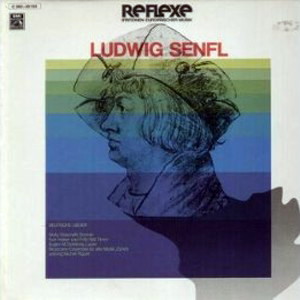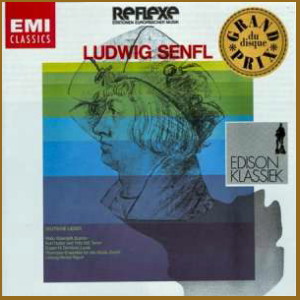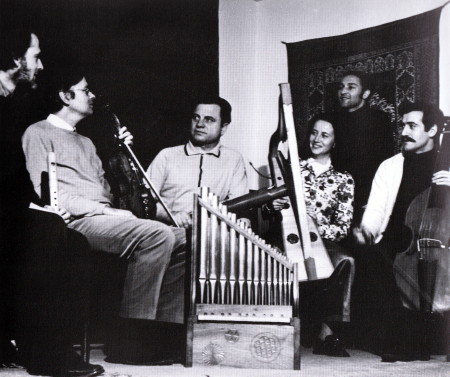 |
1 LP -
1C 063-30 104 - (p) 1972
|

|
| 1 CD - 8
26470 2 - (c) 2000 |
 |
| 1 CD -
CDM 7 63443 2 - (c) 1991 |
|
Ludwig Senfl
(um 1490-1543) - Deutsche Lieder
|
|
|
|
|
|
Carmen in ré
- Pommer I + II, Posaune,
Dulzian, Spinett
|
1' 08" |
|
Bicinia - Pommer
I + II
|
0' 58" |
|
I. Im Maien
- Tenor, Schlagzeug, Spinett,
Pommer I + II, Posaune, Dulzian
|
1' 34" |
|
II. Lust hab ich
g'habt zuer Musica - Tenor,
Spran-Blockflöte, Fidel, Gambe
|
2' 29" |
|
| Was wird es doch
des Wunders noch - Laute |
2' 51" |
|
| Ich schell' mein
Horn - Laute |
1' 03" |
|
| III. Ich schell'
mein Horn - Tenor,
Spinett, Pommer, Posaune, Dulzian |
2' 03" |
|
| Ich schell' mein
Horn - Spinett |
1' 06" |
|
| Carmen - Pommer
I + II, Posaune, Dulzian, Spinett |
0' 51" |
|
| IV. Ich weiß
nit, was er ihr verhieß - Tenor,
Blockflöte, Fidel, Dulzian |
0' 45" |
|
| IV. Ich weiß
nit, was er ihr verhieß - 2
Tenor, Blockflöte, Fidel, Dulzian |
0' 56" |
|
| Carmen in la
- Blockflöte, Fidel, Gambe |
2' 35" |
|
| V. Unsäglich
Schmerz - Tenor, Fidel,
Gambe, Dulzian |
4' 09" |
|
Lamentatio-Carmen
- 2 Blockflöten, Fidel, Gambe,
Laute
|
1' 16" |
|
| VI. Will niemand
singen - Tenor, 2
Tenor-Blockflöten, Fidel, Gambe |
2' 14" |
|
VII. Die
Brünnlein, die da fließen - Sopran,
2 Tenore, Sopran-Blockflöten,
Laute, Spinett, Fidel,
alt-Dulzian, Krummhorn, Gambe,
Posaune
|
2' 35" |
|
|
|
|
Ach Elslein,
liebes Elselein - Laute
|
2' 22" |
|
|
| VIII. Ach
Elslein, liebes Elselein - Sopran,
Baß-Blockflöte, Fidel, Gambe |
|
|
|
IX. Es taget vor
dem Walde - Sopran,
Spinett, Pommer, Fidel, Posaune,
Dulzian
|
3' 10" |
|
X. Wann ich des
Morgens früeh aufsteh' - 2
Tenöre, Blockflöte, Fidel, Gambe
|
3' 25" |
|
| VIII. Ach
Elslein, liebes Elselein |
1' 49" |
|
|
IX. Es taget vor
dem Walde
|
|
|
|
X. Wann
ich des Morgens früeh
aufsteh'
|
|
|
|
| - Sopran, 2
Tenöre, Sopran-Blockflöte,
Spinett, Laute, Fidel,
Tenor-Dulzian, Tenor-Krummhorn,
Posaune |
|
|
|
| Ich armes
Maidlein - Spinett |
1' 39" |
|
| XI.
S'io non venni, non importa -
Sopran, Basß-Blockflöte, Fidel |
1' 54" |
|
| Mein
Fleiß und Müeh' - Laute |
1' 45" |
|
| Tandernak
- Tenor-Blockflöte, Fidel,
Posaune, Dulzian, Gambe |
2' 38" |
|
XII.
Mit Lust tät ich ausreiten -
Sopran, Tenor, Sopran-Blockflöte,
Fidel, Gambe, Spinett
|
3' 52" |
|
| XIII.
Ach Gott, wenn soll ich klagen /
Ich armer Mann - Sopran,
Tenor, Fidel, Krummhorn, Gambe |
3' 13" |
|
| Ich
stuend an ainem Morgen - Fidel,
Gambe, Krummhorn |
2' 28" |
|
| Ich
stuend an ainem Morgen - Spinett |
2' 31" |
|
|
|
|
| -
Wally Staempfli, Sopran |
|
| -
Kurt Huber, Tenor |
|
| -
Fritz Näf, Tenor |
|
| -
Eugen M. Dombois, Laute |
|
|
|
| RICERCARE -
Ensemble für alte Musik, Zürich / Michel
Piguet, Leitung |
|
| -
Michel Piguet, Pommer,
Krummhorn, Renaissance-Blockflöte
und Diskante-Dulzian |
|
| -
Richard Erig, Pommer, Krummhorn
und Renaissance-Blockflöte |
|
| -
Christopher Schmidt, Fidel |
|
| -
Jordi Savall, Viola da gamba
(Gambe) |
|
| -
Walter Stiftner, Dulzian |
|
| -
Heinrich Huber, Engmensurierte
Posaune |
|
| -
Martha Gmünder, Renaissance-Spinett |
|
|
|
|
|
Luogo
e data di registrazione |
|
Kirche
Neumünster, Zürich (Svizzera) -
10-13 luglio 1971 |
|
|
Registrazione: live /
studio |
|
studio |
|
|
Producer / Engineer |
|
Gerd
Berg / Johann-Nikolaus Matthes
|
|
|
Prima Edizione LP |
|
EMI
Electrola "Reflexe" - 1C 063-30
104 - (1 lp) - durata 59' 53" -
(p) 1972 - Analogico |
|
|
Prima Edizione CD |
|
EMI
"Classics" - CDM 7 63443 2 - (1
cd) - durata 44' 58" - (c) 1991 -
ADD |
|
|
Edizione CD |
|
EMI
"Classics" - 8 26470 2 - (1 cd) -
durata 44' 58" - (c) 2000 - ADD |
|
|
Note |
|
- |
|
|
|
|
|
 The German
folksongs that have come down
lo us from the sixteenth
century take their subjects
from but a few simple sectors
of overyday life. The largest
grouping of the songs consists
of love songs in which certain
fixed
situations reappear constantly
with but slight
variation in pattern: songs of
happy love come true, of
unhappy love and the pain of lost
or of disappointing love, plus
the odd "Tagelieder"
(songs at daybreak)
portraying the forced
parting of lovers in the
morning after a night of love.
It is with just this last, and
highly popular, group that one
can recognize (and find
evidence most clearly for) one
point that holds true for all
folksonglike love songs: They
were not - as has been a
commonloy accepted notion
since Christian Günther,
Klopstock and young Goethe -
the sublime artistic
expression of a poet’s
singularly individual
experience with love, but
rather the late
echo of something that had
long been "sung a-round",
namely, the "Minnelied" of
late courtly lyric poetry (of
the thirteenth century in
particular). The scenic
settings so completely typical
of the "Minnelied"
were unendingly varied by
ceaseless reshifting and
regroupings. The German
folksongs that have come down
lo us from the sixteenth
century take their subjects
from but a few simple sectors
of overyday life. The largest
grouping of the songs consists
of love songs in which certain
fixed
situations reappear constantly
with but slight
variation in pattern: songs of
happy love come true, of
unhappy love and the pain of lost
or of disappointing love, plus
the odd "Tagelieder"
(songs at daybreak)
portraying the forced
parting of lovers in the
morning after a night of love.
It is with just this last, and
highly popular, group that one
can recognize (and find
evidence most clearly for) one
point that holds true for all
folksonglike love songs: They
were not - as has been a
commonloy accepted notion
since Christian Günther,
Klopstock and young Goethe -
the sublime artistic
expression of a poet’s
singularly individual
experience with love, but
rather the late
echo of something that had
long been "sung a-round",
namely, the "Minnelied" of
late courtly lyric poetry (of
the thirteenth century in
particular). The scenic
settings so completely typical
of the "Minnelied"
were unendingly varied by
ceaseless reshifting and
regroupings.
Only a few other areas of
human experience can be cited
as typical sources from which
subjects were constantly
drawn: hunting and the
profession of - most usually -
the composer of the song or
the musician who performed it
(and who was often the
composer himself).
Consequently, the names of the
text writers are not generally
known, understandably so
since, after all, their
formulations and situations
followed welltrodden paths;
nothing really new was being
expressed, nor was there even
the desire to produce such
novelty. No nature poems are
to be found in the lyrics of
this period although several
nature pictures were among the
most popular scenic settings
both in late medieval poems
and in the folksongs derived
from them. Elements of nature
as such were still not given a
specific place of their own in
literary thought; they were
looked upon simply as the
framework in which man lived
and was active. In
songs, processes of nature
were mentioned only to shed
light upon the human situation
depicted; events of human life
and of nature - following a
custom that was centuries old
- were drawn into parallel
relationships. Yet for us
today, despite the stereotyped
molds, all of this seems to
have been accomplished with
extreme charm.
These origins and the fact
that the folksong had its base
in the uncontrived social and
community life of the
sixteenth century make it
understandable that there can
be no authentic wording of the
texts, nor even a fixed number
or arrangement of stanzas. As
a result, certain texts - and
in many case also the number
of stanzas - in the versions
employed on this recording
differ from those found in
folksong collections of the
period.
Where
possible, attention is
regularly called to parallel
stanzas or songs in the two
best known and most complete
collections of the period:
1) - Georg
Forster’s Frische teutsche
Liedlein ("Fresh
Little German Songs")
first published
in 1539, edit. by M.
Elizabeth Marriage,
found in Braune’s Neudrucke
deutscher Literaturwerke
des 16. und 17.
Jahrhunderts ("New
Printings of German
Literary Works of the 16th and 17th
Centuries"), Nos. 203-6;
Halle, 1903.
2)
- The Ambraser Liederbuch
(Lb) of 1582, edit.
by Joseph Bergmann, Stuttgart,
1845 (Reprint,
Hildesheim, 1962).
In
addition comparisons are
regularly made with the three
volumes of Arnim-Brentano’s
Des Knaben Wunderhorn
(Wh), Heidelberg, 1806-8, in
the new edition by Heinz Rölleke,
Frankfurt, 1973, and the
modern 2-volume collection Deutsche
Volkslieder, Texte und
Melodien (German
Folksongs, Texts and
Melodies), edited by Lutz Röhrich
and Rolf Wilhelm Brednich
(R-Br), Dusseldorf, 1965-67.
Correct understanding of
sixteenth century songs
pre-supposes considerable
knowledge of the historical
language, especially since
many of the archetypes of
these folksongs went back into
the Golden Age of Middle High
German and many of the words
and phrases were simply passed
on in a set manner - and were
perhaps not always understood
even in the sixteenth century.
For these reasons, both
general and specific language
notes, when considered
essential for proper
understanding of the song
contents, are offered
following a short general
characterization of each song
and reference to one of the
collections listed above.
Fritz
Tschirch
(Translation:
E.D. Echols)
|
|
|
EMI Electrola
"Reflexe"
|
|
|
|

